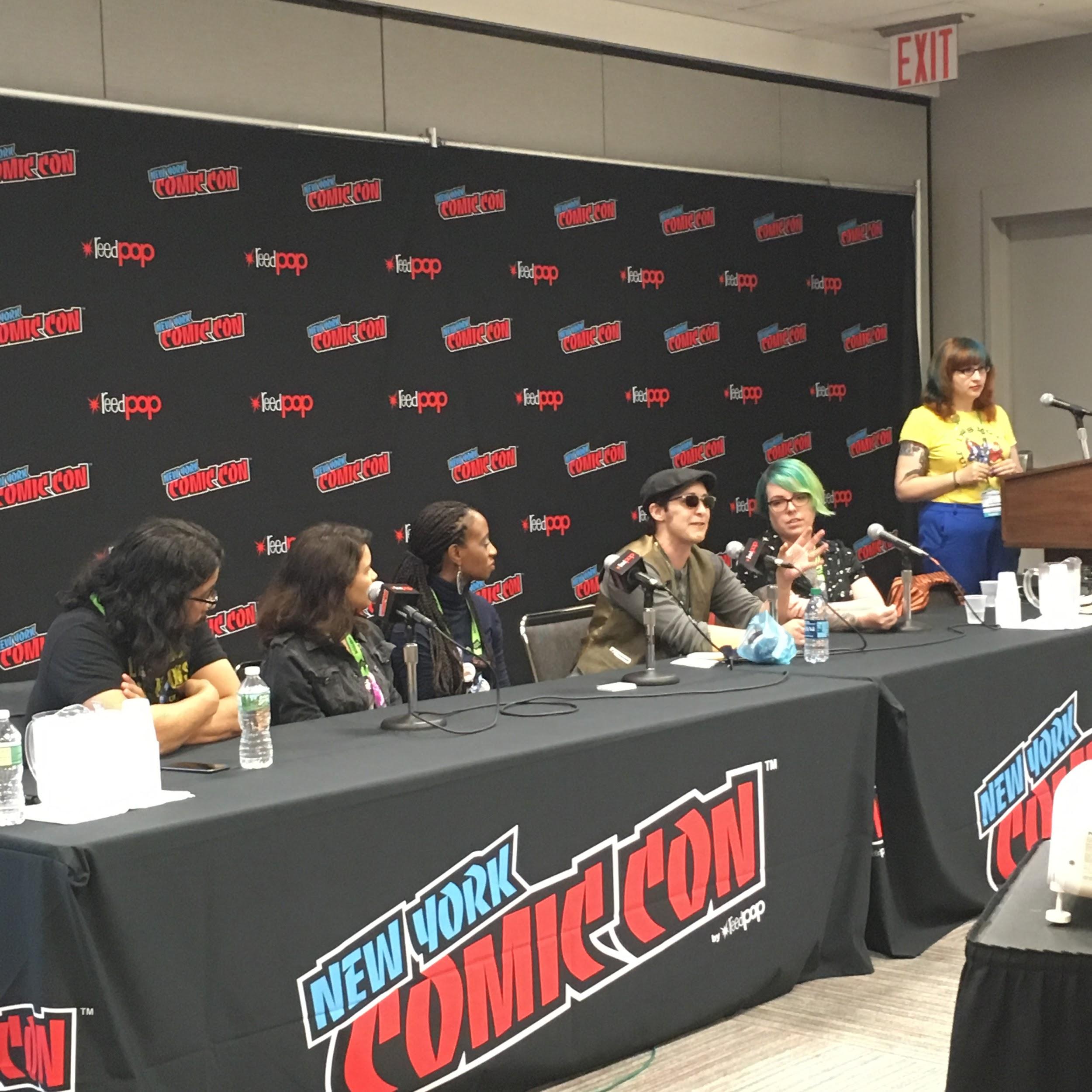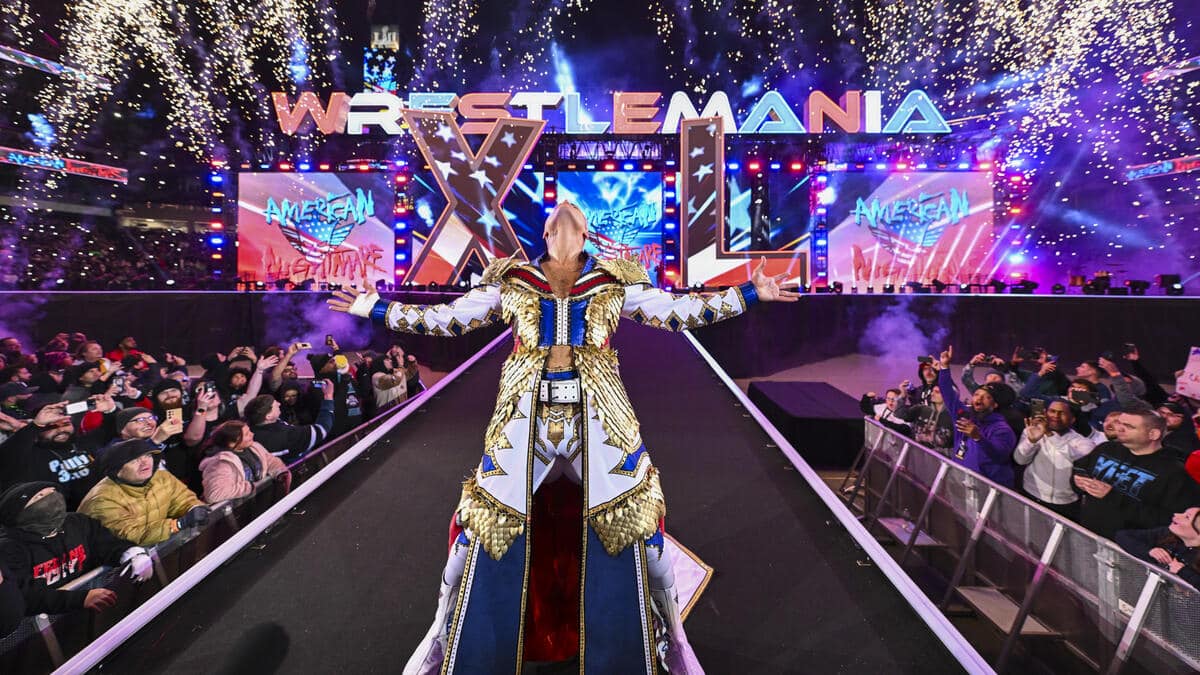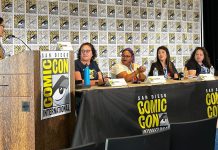[For #BlackOutTuesday The Beat is reposting content that spotlights black voices and issues – originally posted 10/18/18.]
By Adam Karenina Sherif
Content Warnings: sexual assault, sexism, racism
This past weekend at NYCC saw a number of panels which earnestly attempted to push into more critical comics territory. Moderator Elana Levin, a comics podcaster and digital political organiser, guided the panel through a series of topics which offered some especially engaging insights into how marginalised readers and creators can engage with a comics canon comprised principally of works by cis-het white male creators.
Jay Edidin, podcaster and comics journalist, spoke on how an appreciation of craft can be a way in with problematic works. While not necessarily separating art from artist, he emphasised that “I love Frank Miller’s Daredevil because you can watch him evolve through the run”. A different side of the same coin, Regine Sawyer of Lockett Down Productions and founder of the Women in Comics Collective International, suggested that as a creator it’s possible to learn from the insensitivities of classic works: “with the Claremont run, there were these little things that go un-addressed that were troubling. Like, Rogue being assaulted on a train in Uncanny X-Men – and it’s never looked at. And that made me want to grow as a writer, and work out how I could navigate stuff like this in the world of comics”.
Speaking on the question of subtext, Meg Downey, critic and journalist at Polygon and IGN gave the great example of Captain America’s childhood friend Arnie Roth: “He exists for a brief time, he’s a very weird character. He’s Steve’s old friend who ages normally and has a life-partner who’s never called his husband, but absolutely is. And Steve’s just completely accepting. It’s never explicit, but it’s there and it’s important to me”. Of course, the importance of subtext to some readers speaks to the lumbering pace of change at the major publishers and their historical unwillingness to insist on better and wider representation. Edidin hit on this, remarking that “when it’s queer, it’s subtext, but if it’s straight it’s happily taken as ‘text’. And that’s bizarre. Just because it’s not explicit, doesn’t make something not textual”.
Levin asked the panel where they draw their lines as far as what they can and cannot tolerate, prompting some sincere and measured responses. For herself, she offered that “if I can tell the writer is trying, I’m more tolerant with older stuff”. Desiree Rodriguez, CPU co-ordinator at Lion Forge, referred to the rape of Hippolyta by Hercules in George Pérez’ Wonder Woman. Despite her affinity for Pérez, a fellow Puerto Rican, she couldn’t excuse it: “the rape apology might be a product of its time, but that doesn’t mean it’s okay. You have to acknowledge problems, and be willing to talk about them – and not living in willful ignorance”. Finally, Saladin Ahmed, Eisner-winning writer of Black Bolt and the upcoming Miles Morales, brought a brutally-honest perspective to proceedings: “I maybe forgive more because I come from a place of despair. Because in everything I consume, I’m cutting people slack. We live in a racist, sexist society – so my bar is lower, and I’ll lift up anything that rises above the baseline”.
Levin rounded out the panel by asking how the industry can continue to make progress as far as creating works that don’t serve to perpetuate the alienation of marginalised readers, critics and creators alike. From a writer’s viewpoint, Ahmed suggested “it’s about honouring specificity. If you’re gonna honour the human story, you are shaped by everything in your background. It all matters – I can’t stand that ‘Oh, it’s not intrinsic to the character‘ shit”. Within publishing structures, Rodriguez highlighted different stages of production, affirming “I believe in editing, research, consulting, and sensitivity readers”. Lastly and unanimously, all the panelists stressed the importance of diversity at the creative, editorial and corporate levels. Edidin summed up that “change has to come from both directions – grassroots, and institutionally”.









Unfortunately, rape has long been used in adventure comics and action movies as a plot device — to motivate the male hero to seek revenge. Mark Millar as been especially bad about this.
The feelings of the rape victim hardly matter in most of these comics and movies. (Clint Eastwood’s “Sudden Impact” is a rare exception, as it involves a woman seeking her own revenge.)
Comments are closed.